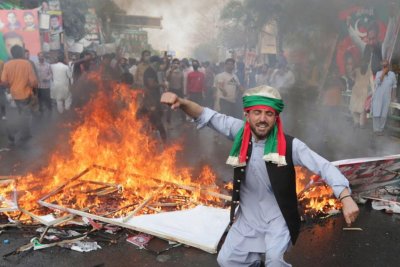Pakistani court sentences journalists and influencer for ‘digital terrorism’

Seven Pakistanis were tried in absentia and sentenced to life in prison on Friday for “digital terrorism” amid riots following the 2023 arrest of former Pakistan Prime Minister Imran Khan. File Photo by Rahat Dar/EPA
Jan. 2 (UPI) — An anti-terrorism court in Islamabad, Pakistan, on Friday sentenced five journalists, a YouTube influencer and a military officer to two life sentences each for “digital terrorism” crimes.
Anti-Terrorism Court Judge Tahir Sipra announced the verdicts for the defendants, who were tried in absentia.
Pakistani law allows for trials in absentia, but their verdicts must be confirmed by the Islamabad High Court.
Those who were sentenced were Akbar Hussain, Wajahat Saeed Khan, Haider Raza Mehdi, Moeed Pirzada, Shaheen Sehbai, Sabir Shakir and Adil Raja.
Raja is a YouTube influencer, while Khan, Shakir, Sehbai, Mehdi and Pirzada are journalists. Hussain is a former Pakistan army officer.
The court found that the seven defendants encouraged riots on May 9, 2023, after former Pakistani Prime Minister Imran Khan was arrested briefly in Islamabad for alleged corruption.
Imran Khan’s supporters attacked governmental buildings and military facilities in several locations.
Prosecutors brought 24 witnesses against the defendants and said they used their respective digital media channels to incite riots, enable attacks and amplify the violence against governmental institutions.
If their sentences are upheld, each faces up to life in prison plus a $5,500 fine for criminal conspiracy.
Each also could be sentenced to another 10 years in prison and fined more than $2,200 for waging or attempting to wage or abetting in waging war against Pakistan.
Additionally, each defendant has been sentenced to 15 years in prison for three counts of violating the Anti-Terrorism Act of 1997 and fined nearly $7,000.
All sentences are to run concurrently if upheld by the higher court.
